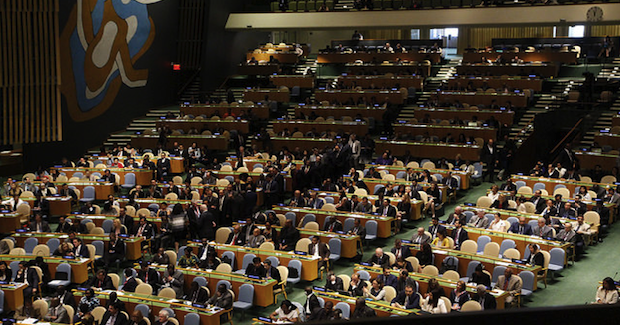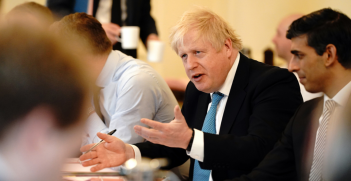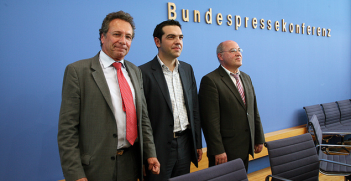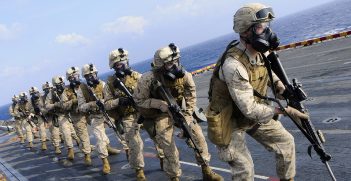Australia and a Nuclear Weapons Ban

On 27 October, the UN General Assembly voted to begin negotiations on a ban of nuclear weapons once and for all. The vote was carried by a majority of members, but the major nuclear armed states voted against the move or abstained. Australia joined the opponents. The vote has split historically like-minded international advocates of strengthened global nuclear non-proliferation and disarmament measures and is likely to bring an end to Australia’s traditional bipartisan approach to nuclear issues.
For decades, Australia has had a roughly bipartisan approach to global nuclear issues. This stretches back to ratification of the Nuclear Non-Proliferation Treaty (NPT) in 1973, and through the bipartisan deal struck to facilitate uranium exports in the 1980s. It has involved strong support for measures to prevent the further spread of nuclear weapons and a parallel commitment to the reduction of nuclear arsenals. True, there have been differences of emphasis between the major parties, but these have mostly stemmed from the weight accorded to multilateral processes rather than policy.
Nuclear weapons ban treaty
However, the recent international push to negotiate a treaty purporting to to ban nuclear weapons has challenged Australia’s bipartisan policy approach, as well as the country’s image as a white knight championing international nuclear control efforts. The government opposes the treaty negotiations in principle, whereas Labor firmly supports the move.
Recall President Obama’s Prague speech: “I state clearly and with conviction, America’s commitment to seek the peace and security of a world without nuclear weapons.” However, progress has been slow and is now in reverse. The Intermediate-Range Nuclear Forces (INF) Treaty, which eliminated a whole class of missiles, is under threat and Russia has unilaterally abrogated its deal with the US for scrapping weapon-grade plutonium.
In response, many countries have sought to highlight the humanitarian impacts of nuclear weapons by building on the 1996 International Court of Justice advisory opinion on their legality. Three international conferences have been convened on the issue: in Oslo (2013), Nayarit (February 2014) and Vienna (December 2014). Australia attended the last two of these, but more as an observer than an engaged participant.
These meetings resulted in the establishment of a UN-mandated open-ended working group on nuclear disarmament which, despite the opposition of Australia and others, concluded in August with a recommendation to commence work on a ban treaty. The 27 October vote in the First Committee of the General Assembly was carried with 123 states in favour (including DPRK), 38 against (including Russia, US, UK, France and Israel) and 16 abstaining (including China, India and Pakistan). In the Asia-Pacific we were joined in opposing the resolution by Japan and South Korea, whereas all ASEAN states supported the proposal.
In a recent Australian senate hearing, both Labor (Shadow Foreign Minister Senator Penny Wong) and the Greens (Senator Lee Rhiannon) questioned why Australia acted the way it did. The government’s answers were not persuasive for some clear reasons:
- A ban treaty would not lead to reductions in nuclear arsenals.
No serious advocate of the treaty expects that by itself the treaty will achieve this. The aim is to further delegitimise nuclear weapons at a time when they are gaining renewed prominence in some national security postures. - A ban treaty would risk damage to the NPT on a number of levels.
The claimed levels of damage are unspecified and only one risk is cited, “creating parallel obligations, ambiguity and confusion”. These are always risks to be mitigated by involvement of sensible defenders of international law such as Australia. - A ban treaty will deepen divisions between nuclear weapon and non-nuclear weapon states, bearing in mind that there will not be any participating in the ban.
It is hard to see the gap getting any wider than it is currently and it remains possible that one or more nuclear weapon-possessing state might in fact participate in the negotiations. Moreover, coherent discussion is not helped by conflating participation in the negotiation and pre-empting willingness to adhere to any resulting treaty text. - A ban treaty does not envisage any verification measures.
Clearly verification will be critical to the elimination of nuclear weapons. A treaty with the aim of promoting delegitimisation of nuclear weapons could, however, avoid that extremely complex domain. Note: Australia supports the biological weapons ban despite it (sadly) having no verification system. - A ban treaty will divert resources and attention from the NPT and work on practical building blocks.
Regrettably, there are no other promising building blocks. The nuclear test ban treaty is still not in force and the proposed ban on production of bomb grade materials has been stalled for decades. The NPT must be nurtured, but the treaty itself is not designed or capable of giving effect to the commitments its members have made to disarm. Australian officials cited work on verification: this is hugely important, but engages few and will only have relevance when the political will to disarm is mobilised. - The time is not right for such a treaty.
Sadly, the time has never been right. Times of heightened crisis can, however, provoke action. Reagan and Gorbachev’s 1995 meeting in Geneva declared “a nuclear war cannot be won and must never be fought”. Is there any different conclusion to be drawn today?
Opponents of the ban treaty negotiation also imply that such a negotiation could weaken assurances of extended deterrence. However, all countries concerned understand that nuclear deterrence will have a role to play until the last weapons are dismantled. The trick is to minimise the risks involved on the road to zero.
The advocates of accelerated disarmament would much prefer more practical steps but none are currently on offer. Officials say no decision has been made on Australian participation in the negotiations. But Australia and other sceptics should participate and try to achieve something useful out of an admittedly not hugely promising process.
John Tilemann is the director of research for the Asia Pacific Leadership Network on Nuclear Non-Proliferation and Disarmament. He is a former career diplomat with the Department of Foreign Affairs and Trade. John was posted to the IAEA between 1987 and 1990 and to the Middle East as Australia’s Ambassador to Jordan 2002-6. He was chief of staff to IAEA Directors-General Hans Blix and Mohamed ElBaradei from 1992-98.
This article is published under a Creative Commons Licence and may be republished with attribution.





